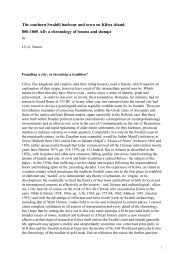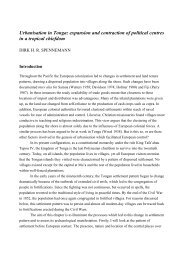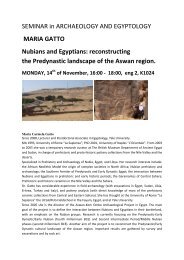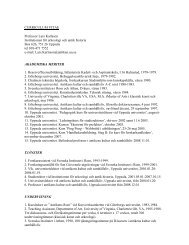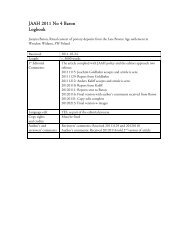Beowulf - Institutionen för arkeologi och antik historia
Beowulf - Institutionen för arkeologi och antik historia
Beowulf - Institutionen för arkeologi och antik historia
Create successful ePaper yourself
Turn your PDF publications into a flip-book with our unique Google optimized e-Paper software.
The second poem seems ultimately to have been inspired by the same event as the<br />
first one, though it contains elements of Venantius’ private feelings for Lupus. Everything<br />
is seen from Venantius’ personal point of view so that as a counterpart to the<br />
first poem, it appears as a private panegyric written by the devoted poet to his<br />
beloved patron.<br />
104<br />
The Official Panegyric<br />
The poem starts with an introduction praising Lupus’ general qualities (ll. 1–18) stressing<br />
his loyalty to the people. In the next six lines (ll. 19–24), his loyalty to King and the<br />
State, two entities which are in many ways one and the same, is pointed out. Brunhild’s<br />
marriage to the State in Book VI, poem 1 is in other words echoed in the relationship<br />
between Lupus and Sigibert.<br />
At line 25 there is a slightly bewildering break in the narrative of the poem when out<br />
of nowhere an embassy arrives. This kind of caesura is unusual in Venantius poetry, but<br />
common in Anglo-Saxon verse (cf. <strong>Beowulf</strong>, vv. 86, 194, 499, 782 etc.) or even<br />
frequent, e.g., in the fragment about the fight at Finnsburg (Klaeber 1950, pp. 245 ff,<br />
vv. 18 and 43), and we are given a description of negotiations between the visiting<br />
emissaries and Lupus (ll. 25–30). No diplomatic solution is reached, but nevertheless<br />
positions are made clear in the process. This lack of agreement leads in turn to a<br />
conflict that must be solved by force. In lines 31–44 the poet continues to emphasise<br />
Lupus’ righteous and law-abiding personality, but we are also informed that the high<br />
Merovingian commanders are seeking him, in all probability to discuss the conflict. In<br />
the fifth section (ll. 45–60), Lupus takes command of half of the army and he destroys<br />
some Saxon and Danish intruders in the northern part of Austrasia in an effective way<br />
suitable to a hero. In lines 61–72 he returns to the hall, restoring its peace and happiness.<br />
The poem ends by once again stressing his general qualities. His actions have<br />
added to his greatness and the conclusion depicts him as the eloquent, amiable host<br />
satisfying his guests with food—a vision of Lupus in his own ducal hall.<br />
This is also the section in which Venantius wonders if he is sufficiently worthy to<br />
praise Lupus. However, in the last two lines he manages to demonstrate his skill expressing<br />
a most Solomonic wish, flattering to the King as well as Lupus:<br />
81 sit tibi summus apex illo regnante per aevum,<br />
vitaque sit praesens atque futura colat.<br />
(Venantius Book VII, poem 7)<br />
May your great honour, during his (i.e.Sigibert’s) reign, last for ever and may he<br />
enjoy his present life and think about the coming.<br />
The core of the poem is Lupus’ usefulness to the people as well as the King, mostly,<br />
however, to the King since it is due to the services to the King and the State that<br />
Gallia, i.e. the nation and the people, deserves him.



